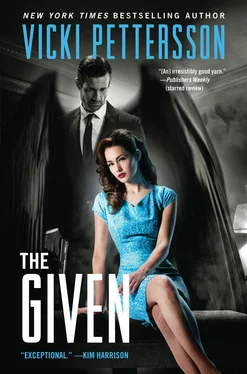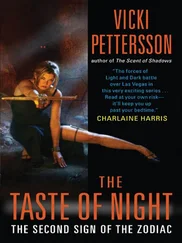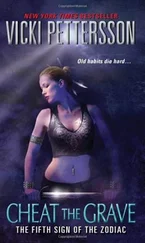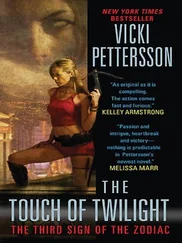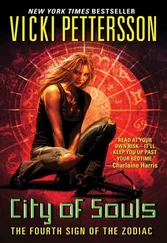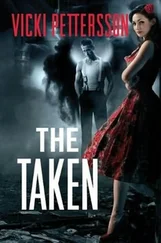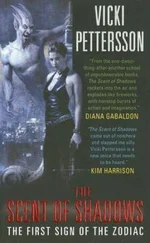Grif caught one last glimpse of the woman wearing furs and glittering hooves before the elevator doors slid shut, and he began his ascent. At least the paper had mentioned that Barbara lived on the fifteenth floor. When he stepped out again, it was into a hallway carpeted in elegant grays. A soft chime seemed to greet his arrival, but no . . . it was just the second set of elevator doors sliding shut, heading down. Good timing.
Moving quickly, Grif waved his hand in front of a smoky, half-domed camera. A sizzling sound slithered through the air before smoke began trailing from beneath the dome. The celestial powers left to him after his return to inhabit flesh didn’t extend much beyond this simple magic trick, but sometimes it was enough.
“Okay, Barbara,” he muttered, turning to face the long, silent hall. “Let’s find out why you think I deserved to die.”
Suite 1509. The exact number hadn’t been in the paper—the one not due to be printed for another two days, he reminded himself—but Grif didn’t need it. The plasmic thread snaking down the hall was enough to tell him he had the right place, and that Barbara was home. Sarge hadn’t given him much of a lead.
He considered knocking, but decided he’d rather risk frightening Barbara, and saving her life, than alerting her attackers to his presence. So he pulled the snubnose pistol from his ankle holster and placed his other hand on the door, which snicked open with one well-directed thought.
The marble foyer was black and white, and flanked by two grand marble pedestals, each holding fresh flowers destined to live longer than the woman who’d bought them. Unless I have a say in the matter, Grif thought. Pistol up, he edged around the glossy center console.
The arched ceiling thwarted his caution and amplified his footsteps so that his soles squeaked, even as he tiptoed, careful to avoid the crystal urns and ceramic statues clustered nearby. Dust catchers, he thought. Or that’s what they called them in his day, and they seemed to serve the same useless purpose now.
A short hallway linked the entrance to the main room, and Grif craned his head to find a creamy pastel living area dotted with soft fabrics, cashmere throws, and velvet settees. It was vast, too. Grif could feel its size as he edged forward, taking note of the bold artwork hanging in ornate gold frames. The vibrant swaths of paint put Grif in mind of bodies intertwined, the whorls and loops somehow erotic despite the lack of function or form. One more step allowed a slivered view of the glittering valley from a floor-to-ceiling window that was currently open at one end and sucking out room spray . . . and the scent of gunpowder with it.
Gun braced before him, Grif swiveled around the corner, and pivoted left, then right, before straightening his knees. He sighed.
“These dames and their white carpeting,” he muttered, and stepped into the blood-splattered room. A woman lay splayed on her stomach, facedown, or would’ve been if she’d still possessed a face.
Softening his vision and allowing his celestial eyesight to rise to its forefront, he searched for signs of the plasma he’d spotted in the hall, but it was gone, as was the murdered soul and her assigned Centurion. Just as well. Victims of violent death could develop an emotional tic if they stared at their mortal remains for long. It made regret and grief harder to work out in the Tube.
So much for saving Barbara McCoy, Grif thought, cursing himself as he ventured closer. His feet sunk into the thick carpeting, though he was careful to skirt the still-widening ring of blood. He thought of the elevator dinging just as he gained the fifteenth floor, and cursed again, knowing he’d missed this murder by minutes. Why the hell had Sarge allowed that? Bending, Grif inspected the body. Barbara had been wearing a white silk pantsuit, as if dressed to match the grand suite. It was probably what they’d call winter white—also an impractical color for death—but at least she’d look sharp for eternity.
Grif slid his gaze up the body to where her head should have been. The shot had come from up close. Personal, he thought, glancing up and around. Despite all the crystal and vases and array of tchotchkes lacking any practical function, there were no frames, no photographs, and no way for Grif to see what the woman had looked like before someone took her head away.
Eyes scanning the floor again, Grif also realized Barbara had already been prone at the time of her death. The blood splatter was wrong for a standing kill. The killer, or killers, had levered themselves low, too, eye-level with the victim just in case the bullet passed through the brain. It would then strike the wall, not go straight down into floor.
But why hadn’t any of the neighbors reported a blast? Grif wondered, gaze winging to the hole in the wall. And where were the footprints leading away from the body?
One thing was certain, Grif thought, lowering his gun. The killer was gone—likely out that open window—and so was her Centurion. So why, he wondered, gaze winging up to the dark hallway across from him, was there still plasma snaking down the . . .
Grif’s .38 flew from his hand as a thump cracked the back of his skull. The shards from one of the ceramic figurines scattered around him, and Grif thought, Oh. Not just for catching dust anymore. He pushed to his knees, but the gun was too far away and instinct had him spinning instead. He barely managed to raise an arm to block the faceful of flowers hurtling his way. Then a shot rang out, and glass fragments rained over his head. He shielded himself again, shocked at how close his head had come to looking remarkably similar to the dead woman’s.
But the gunshot from the hallway had done the job. Grif’s fedora was askew, blocking his vision, but he could sense that his attacker was already gone. He lunged for his .38 anyway. Then he cleared the center of the room, holding himself up against a wall until his vision stopped scattering into geometrical patterns. He didn’t know if the person down the hall—the one the plasma had been chasing—had been trying to hit him with that shot or not, but he had to find out.
Ears pricked, Grif stood unblinking, trying to thrust his mortal senses outward. It would be just like Sarge, he thought, to set him up. The story about feeling their pain could be pure baloney. Taking him two days back in time, directing him to a murder scene so new that nobody had even learned of it yet, would be a good way to appease the Host, get his errant charge killed and back into the Tube.
“C’mon, Shaw,” he chided himself, even as he thought it. Sarge wouldn’t do that.
Would he?
Cocking the hammer back on his snubnose, Grif sidestepped the body and moved farther into the silent condo. The footprint of the home was intuitive, and favored the north side of the building. That’s where the money view was, so the guest bath lay on the right, while the stunted hallway broke to the left. More of the strange, sexy artwork swirled up the walls like colored smoke, but Grif put his back to the largest frame, softened his gaze, and stared at the closed door rounding out the home.
He couldn’t see through it, his celestial powers didn’t extend that far, but he was looking for signs of plasma, an indication that someone was about to die. Unfortunately, he wouldn’t be able to see the telltale warning if he were the fated victim. You never saw the plasma when it came for you.
But instinct, honed by two lifetimes and fifty years of limbo in between, told Grif that something was moving behind that door. Besides, who the hell went around closing doors behind them in their own house?
Grif planted himself to the side of the door before turning the handle and shoving it open. He didn’t enter. Experience had taught him that most people found silence and stillness unbearable when anticipating confrontation.
Читать дальше
